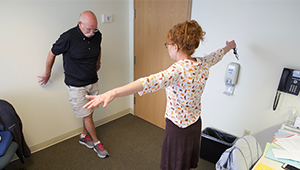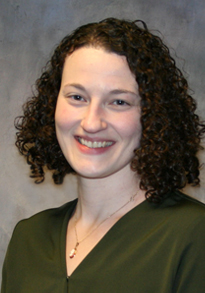Mikael Anne Greenwood-Hickman, MPH
Biography
Mikael Anne Greenwood-Hickman, MPH, brings a mixed methods approach to geriatrics and aging research. Through the application of both quantitative and qualitative methods, her work aims to better understand the lives and behavior of older adults in order to build interventions and tools to preserve cognitive and physical function and promote wellbeing.
Since completing her Master of Public Health in epidemiology at the University of Washington in 2014, Ms. Greenwood-Hickman has served in several roles within public health research teams, including as a data manager, programmer, and project manager. In 2021, Ms. Greenwood-Hickman formally joined the KPWHRI faculty as a collaborative scientist, bringing her operational knowledge and management skills to bear on her scientific portfolio.
Ms. Greenwood-Hickman’s research interests and work are primarily focused on understanding physical activity and sedentary behavior patterns among older adults and developing and testing interventions to promote physical activity and reduce sedentary time. She has been an active collaborator on the Adult Changes in Thought (ACT) Study’s Activity Monitoring sub-study since 2018. As part of this work, she has a particular interest in research that links data gathered by accelerometers (activity trackers that electronically detect up-and-down, side-to-side, and back-and-forth motion) to cognitive and physical function outcomes in later life. Her current work in ACT explores applications of the 24-hour activity cycle framework to the epidemiology of aging. Outside of ACT, Ms. Greenwood-Hickman leads accelerometer data collection and processing for ongoing intervention and observational studies using a variety of research and commercial accelerometers and platforms. She pairs this work with qualitative analysis efforts that seek to elucidate participants’ lived experience engaging in physical activity and sedentary behavior research and behavior change.
Areas of research focus
-
Aging & Geriatrics
-
Behavior Change
-
Obesity
-
Physical Activity/Sedentary Behavior
-
Built Environment
-
Chronic Illness Management
Recent Publications
Florez-Acevedo S, Greenwood-Hickman MA, Zhu W, Cook AJ, Delaney K, Green BB, Arterburn DE, McClure JB, Rosenberg DE Exploratory Analysis of Mental Health and Quality of Life Outcomes in a Randomized Controlled Trial to Reduce Sitting Time in Older Adults With Obesity 2025 Nov 12 doi: 10.1123/japa.2024-0387. Epub 2025-11-12. PubMed
Jankowska MM, Tribby CP, Hibbing PR, Carlson JA, Greenwood-Hickman MA, Sears DD, LaCroix AZ, Natarajan L Movement- and Posture-based Measures of Sedentary Patterns and Associations with Metabolic Syndrome in Hispanic/Latino and non-Hispanic Adults 2025 Oct;12(5):3086-3094. doi: 10.1007/s40615-024-02114-w. Epub 2024-08-12. PubMed
Zlatar ZZ, Greenwood-Hickman MA, Lujan LNM, Cooper J, Florez-Acevedo S, Marquez DX, Aceves RG, Vargas AP, Rosenberg DE Feasibility and Cultural Adaptation of a Community-Engaged Physical Activity Intervention for Hispanic Older Adults: Pilot Study 2025 May 27;9:e65489. doi: 10.2196/65489. Epub 2025-05-27. PubMed
Greenwood-Hickman MA, Yarborough L, Shulman L, Arterburn DE, Cooper J, Delaney K, Estrada C, Green BB, Holden E, McClure JB, Romero D, Rosenberg DE Understanding Goal Setting and Behavior Change Mechanics in an Older Adult Sitting Reduction Intervention 2025 May;39(4):627-636. doi: 10.1177/08901171241302137. Epub 2024-11-21. PubMed
Greenwood-Hickman MA, Zhu W, Idu A, Harrington LB, McCurry SM, LaCroix AZ, Shaw PA, Rosenberg DE Associations Between 10-Year Physical Performance and Activities of Daily Living Trajectories and Physical Behaviors in Older Adults 2025 Apr 29;22(5). doi: 10.3390/ijerph22050704. Epub 2025-04-29. PubMed
Healthy Findings Blog

Meet KPWHRI’s collaborative scientists
The division contributes to research across the institute with methodological and subject matter expertise.
New funding

Grant of over $55M to boost Alzheimer’s, dementia study
Kaiser Permanente Washington will co-lead an expanded ACT Program to better understand the aging brain.
Healthy Findings Blog

We decreased people’s daily sedentary time by an hour
Changing behavior isn’t easy, but Dr. Dori Rosenberg helped older people to stand and walk more.



